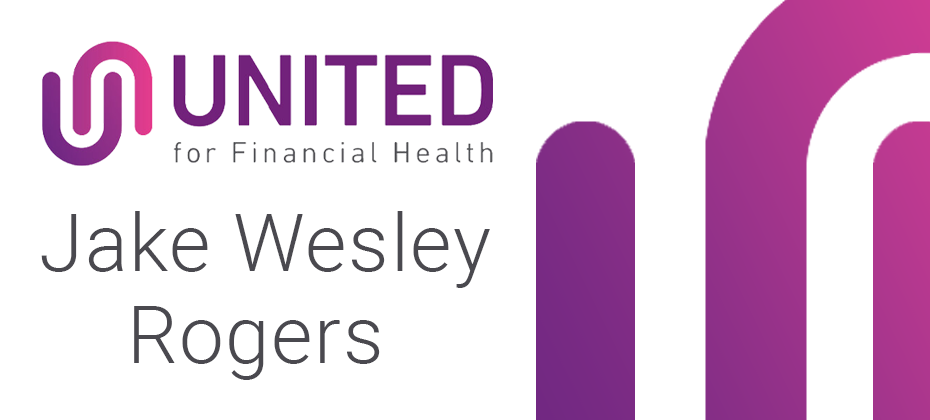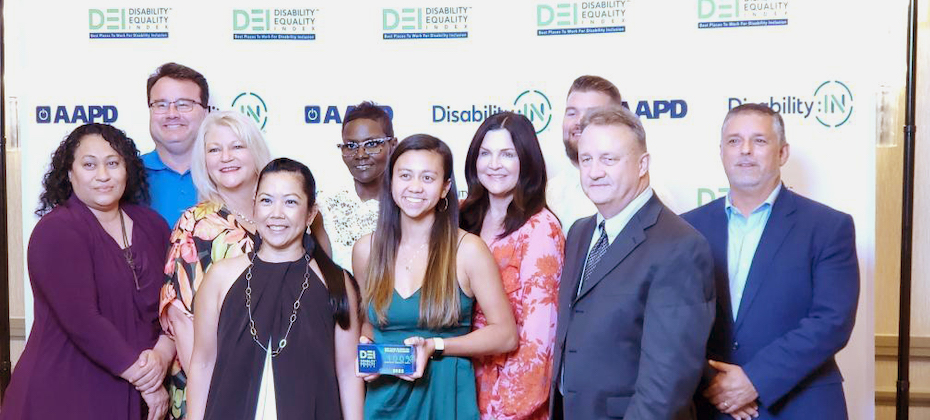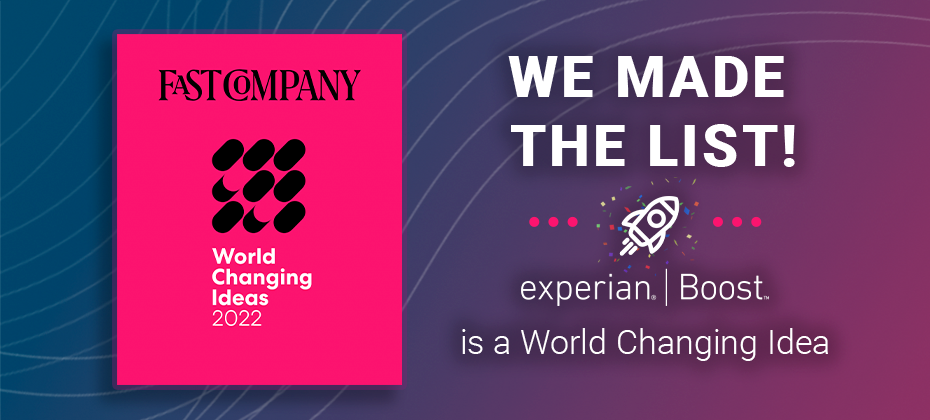Featured
Featured

At Experian, we are proud to have a culture where our teammates can bring their whole selves to work. Perhaps no one exemplifies that spirit as much as our newest United for Financial Health partner, pop artist Jake Wesley Rogers. Jake is debuting a two-part Financial Glow Up video series across his social media channels to raise financial health awareness. Known for his bold style in music, fashion and expression, Jake is lauded as a queer storyteller through a universal lens and will soon take his talents on the road, as the opening act for Panic! At The Disco’s tour this fall. His new videos are a creative and intimate look inside the financial aspects of his career. He takes us along as he prepares for his upcoming tour, highlighting how managing everyday financial decisions, like using Experian Go, can empower consumers. Our partnership with Jake is the latest in a trio of new United for Financial Health partnerships focused on the LGBTQ+ community. Last month, we announced our support for Born This Way Foundation and its Channel Kindness, and we’re excited Jake is joining our efforts with another new Experian partner, True Colors United which aims to end homelessness among LGBTQ+ youth. Earlier this year, we announced a process to help transgender and non-binary consumers change their name on their Experian credit report without losing their credit and financial history. During Pride Month, our weekly Twitter #CreditChat addresses important financial topics such as Financial Tips for Same Sex Couples and the LGBTQ+ Community. To learn more about Experian’s commitment to financial empowerment for all, check out The Power of You: 2022 Diversity, Equity and Inclusion Report. You can catch the first of Jake’s new Financial Glow Up videos on his Instagram and TikTok, and by searching #JWRExperian on those channels.

In my role as Chief Sustainability Officer at Experian, I often hear from communities that feel that they’re not seen or heard. That they’re marginalized. I’m proud that our United for Financial Health (UFH) program can be a global catalyst towards financial inclusion. This is the kind of work UFH is supporting with two new partners: Born This Way Foundation (BTWF) and True Colors United. Founded by Lady Gaga and her mother Cynthia Germanotta, Born This Way Foundation supports youth mental health and created Channel Kindness, a digital storytelling platform. Experian is proud to support an expansion of Channel Kindness, which will be a safe space for young people to reflect on significant financial days throughout the year such as college graduation, tax day and a #BeKind21 Campaign event focusing on the role kindness plays in a person’s financial wellness. True Colors United was founded by Cyndi Lauper, and aims to end homelessness among LGBTQ+ youth. We will collaborate with them to create financial literacy resources to help this “invisible” community overcome barriers to fair and equitable access to credit and financial tools. These new partnerships are just a couple examples of our support for the LGBTQ+ community. Earlier this year, we achieved a 100% rating on the Corporate Equality Index from the Human Rights Campaign Foundation in the U.S., making Experian a Best Place to Work for LGBTQ Equality for the fourth consecutive year. We also received a Silver Award from Stonewall for our commitment to inclusion of LGBTQ people in the workplace. We provide a process to assist trans and non-binary consumers with name changes to their Experian credit reports. During Pride Month, our weekly Twitter #Creditchat addressed important financial topics such as Financial Tips for Same Sex Couples and the LGBTQ+ Community. We look forward to sharing stories from Channel Kindness and the resources from True Colors United. To learn more about Experian’s commitment to financial empowerment for all, check out The Power of You: 2022 Diversity, Equity and Inclusion Report.

During Disability Pride Month, we are especially proud and hopeful by our most recent honor: Experian earned a score of 100 out of a possible 100 in the Disability Equality Index® (DEI). The DEI is the world’s most comprehensive benchmarking tool for the Fortune 1000 and Am Law 2001 to measure disability workplace inclusion against competitors. Several of our colleagues were on hand at the recent 2022 Disabilty:IN Conference to pick up our award. We improved from our score of 90 last year, and are considered a Best Workplace for Disability Inclusion. We’re honored to partner with two of the community’s leading organizations, Disability:IN and the National Disability Institute towards our commitment to financial empowerment for people with disabilities. We’re hosting conversations like this one to raise awareness of the barriers and explore solutions to financial inclusion. Experian is powering the credit resource page of the Financial Resilience Center so consumers have information at their fingertips. People with disabilities represent over one billion people across the globe. As one of our colleagues who represented Experian on a panel about innovation at the 2022 Disability:IN Conference explains, disability is a natural part of the human experience, and it crosses lines of age, ethnicity, gender, gender identity, race, sexual orientation, socioeconomic status and religion. It’s in that spirit that we held a Global Hackathon, challenging our colleagues to create future products and services that can further the mission of financial inclusion and equity for communities worldwide. As co-executive sponsors of Experian’s ASPIRE employee resource group, which advocates for teammates with disabilities, we’re proud to have our progress acknowledged. And we’re hopeful because while we know the work of inclusion will never be done, the Disability Equality Index indicates we’re evolving in the right direction. Learn more about Experian’s commitment to creating a better tomorrow for the communities in which we live and work in The Power of You: 2022 Diversity, Equity and Inclusion Report. Hear from Experian’s Roselyn M. about our culture of inclusion:

We often share at Experian that we want to be an organisation where people are free to be their true selves and have an equal chance to succeed, a place where everyone is celebrated for bringing their whole selves to work. When our colleagues thrive, they innovate, and contribute to the future of the business. It is in this spirit we welcome you to The Power of You: 2022 Diversity, Equity and Inclusion Report. Our second edition is really an evolution. For the first time, we are introducing our global DEI framework and our focus on people, clients and consumers, and the communities in which we live and work. We’re proud to be recognised as a Great Place to Work, as 90% of our colleagues agree Experian people are treated fairly regardless of their social and economic status, sexual orientation, race or gender. In this report, you’ll see examples of the efforts we’ve made over this last year including the work towards gender equity. Our target is for 40% of our senior leaders to be women by 2024. We have engagement programs to encourage women into STEM roles within the business, while the appointment of Malin Holmberg as CEO of our EMEA and Asia Pacific business alongside the promotion of Jennifer Schulz to CEO of our North America business has increased our percentage of senior female leaders. Beyond strengthening our own processes in promoting DEI, we’re partnering with organisations such as Disability:IN, Code First Girls and the National Urban League to help underserved communities gain fair and equitable access to credit and financial resources. More broadly, we are continuing with our United for Financial Health programme. So far, we’ve connected with 87 million people since 2020 and remaining on track to connect with 100 million people by 2024. We were named in Fortune’s 2021 ‘Change the World’ list for our work to improve financial health. Our aim is to be force for good. This is at the heart of our purpose exemplified by all of our 20,600 employees across 43 nations: to create a better tomorrow for consumers, our clients, our people and communities. Please find our latest DEI report in full here.

Experian is a company built on purpose. Every day we help people make the most of their data to improve their financial lives. This is what drives us and you can read more about our progress in our inaugural Improving Financial Health report. It is our social mission to improve financial inclusion, because fair and affordable access to credit enhances opportunities in life. While we are proud of our achievements this year, we know there is more to do. Over a third of the global adult population still lack access to basic financial services, while one billion people don’t have official proof of identity. 1.7 billion people are also completely ‘unbanked’ and risk being overlooked by the entire global financial services system. And this problem exists everywhere. More than 63 million people in Brazil have unmanageable debts that are affecting their credit rating. Whereas in the US, 28 million consumers are ‘credit invisible’ and an additional 21 million consumers have “unscorable” credit files, meaning they have what’s considered a thin credit file or limited credit history. Much of this comes down to provision of appropriate education and knowledge around good financial management, alongside the tools and products that can empower people in gaining access to fair, affordable credit. Through our community investment programme, we have provided vital support to communities, which was reflected by our colleagues volunteering nearly 25,000 hours of their time over the last year. This is in addition to an investment of US$15.9m in programmes that support our communities, including enhancing financial literacy with partners in Brazil, the USA and the UK & Ireland. Examples here include financial literacy support for microentrepreneurs through Sebrae in Brazil, Words That Count with the National Literacy Trust and Number Confidence Week with National Numeracy in the UK, alongside partnerships in the USA with the National Urban League, Operation Hope and Saver Life which aim to empower Black Americans through financial education. In addition, our social innovation products reached over 21 million people this year, offering innovative ways to verify identity and to strengthen credit profiles. It is our aim to help everyone have fair access to finance, no one should miss out on the opportunities which can transform lives. As the current inflationary environment adds extra pressure on households around the world, we recognise the significance of the role we can play to help ensure people can get through this period of financial pressure. Our new report outlines the progress we have made and restates our commitment to helping everyone improve their financial health in the future. Please read more in the Improving Financial Health Report.

We are delighted to celebrate Pride Month this June, and to mark the progress we are making to support our LGBTQ+ colleagues and communities around the world. A few of our milestones this year include: The addition of trans-inclusive healthcare to our UK and U.S. employee benefit packages. Receiving a Silver Award from Stonewall for our commitment to inclusion of LGBTQ people in the workplace. The continued use of our partnerships with Mermaids, Switchboard and Terrence Higgins Trust (THT) to provide resources, offer workshops and support campaigns that raise awareness of the discrimination faced by the community worldwide. Becoming a signatory of the Brazil Corporate Forum for LGBTQA+ companies. Participating in the first diverse talent recruitment fair organised by the Colombian LGBT Chamber of Commerce. Achieving a 100% rating on the Corporate Equality Index from the Human Rights Campaign Foundation in the U.S., and being designated a Best Place to Work for LGBTQ Equality for the fourth consecutive year. Providing a process to assist trans and non-binary consumers with name changes to their Experian credit reports. Throughout the month, employee groups across our regions are hosting events that support our LGBTQ+ employees in their careers, that educate and inform allyship inside our business, and which help accelerate our ambition of delivering tools and services that create better financial health in the community. And yet, while we celebrate, we recognise that the LGBTQ+ community still faces many forms of discrimination around the world. We will continue to look for opportunities to support our Experian colleagues and customers who identify as part of the LGBTQ+ community, and to listen to those with lived experiences, so that we can better understand the role we can play in creating a better tomorrow and a stronger organisation – for everyone.

Two of Experian’s core values – innovation and financial inclusion – are on full display with Experian Boost™ being selected for Fast Company’s 2022 World Changing Ideas Awards, which celebrates the “broadest ideas … that have the potential to affect true systems change.” Experian Boost is a first-of-its-kind service designed to help consumers improve their credit profile and thrive financially. Nearly 9 million people have connected the service to report their on-time utility, telecom, and video streaming service payments. The service tackles inequity and exclusion from the credit economy by enabling consumers to add positive payment history that reinforces their personal financial reliability directly into their Experian credit file, which can potentially boost their credit score instantly. At Experian, we continually focus on expanding credit to underserved communities. Most recently we introduced Experian Go™, a brand-new program that can potentially help the nearly 50 million people in the United States who have a nonexistent or limited credit history. This Fast Company recognition also reflects our purpose and innovative culture focused on creating products and solutions that help consumers thrive, including Experian Boost in the UK and Serasa’s Score Turbo in Brazil. Every day at Experian we are investing in new technologies, talented employees, and innovation to help consumers and our clients maximize every opportunity we have to offer.

Last year, while still in the grip of the effects of the pandemic, Experian North America continued to reinforce our core purpose and People First approach through creating a workplace culture of belonging, employee wellness and personal and professional growth. It’s especially rewarding that this commitment, along with our financial planning and consumer education resources, were highlighted in this year’s Fortune 100 Best Companies to Work For award recognition. For the third year in a row, Experian North America was named to the prestigious national list that honors the “100 Best companies that adapted to massive changes in the workplace by prioritizing employee well-being, inclusion, purpose, listening and care wherever their employees are.” To determine this year’s 100 Best list, Great Place to Work®, America’s largest ongoing annual workforce study, surveyed more than 870,000 employees and gathered data from companies representing more than 6.1 million employees. The survey enables employees to share confidential feedback about their organization’s culture and the employee experience. Great Place to Work cited that “Experian has expanded benefits to include fertility, surrogacy, and adoption coverage and enhanced its higher education financial planning resources. It’s also tackling workplace equity from the very start of the hiring process with an in-house tool called Lingo that identifies gender-biased language in job descriptions.” In addition, “Experian began to hold conferences for employees to discuss their personal struggles during the pandemic. Since then, the company has continued to improve wellness initiatives, while staying committed to flexibility around employee schedules.” “At Experian we’re especially proud of our purpose-driven culture, where all our people play a role in making a positive impact in the day-to-day lives of the consumers, clients and communities we serve. This includes taking care of each other, celebrating our individual differences, and delivering on our purpose to create a better tomorrow for people everywhere,” said Jennifer Schulz, Chief Executive Officer of Experian North America. “This recognition from Fortune reflects the very best Experian offers to all those we help, and I couldn’t be prouder of our people and the work we’re doing.” At Experian, we believe bringing together unique experiences, diverse backgrounds and individual differences creates a dynamic, innovative and inspiring workplace — one reflective of the clients and communities we serve around the globe. This is why it’s such an honor to be recognized alongside other outstanding brands on the Best 100 list that prioritize their employees. This recognition continues the momentum we’ve built in recent months with other industry accolades and awards. In February, Experian North America was named a “Best Place to Work for LGBTQ Equality” for the fourth year in a row in the Human Rights Campaign Foundation’s Corporate Equality Index 2022, receiving a perfect score in the foundation’s evaluation. Last year, Experian North America was named to the Fortune Best Workplaces for Women™ 2021 among large organizations and 100 Best Large Workplaces for Millennials. In addition, we were ranked the #1 Top Workplace in 2021 by the Orange County Register for the second consecutive year.

As a leading information services company, some of our chief priorities include protecting and ensuring the accuracy of consumer information. The integrity of our data is critical and aligns with our efforts to advocate for financial inclusion for everyone. Data accuracy is particularly relevant for the transgender and non-binary community with regard to name changes. It’s important to note that information about gender/sex, age, race, ethnicity, religion or sexual orientation is not included in credit reports or scores. However, when someone transitions, and changes their name, their credit and financial history may still be tied to their birth name, which is also referred to as their “deadname.” This can unintentionally “out” the consumer or force them to establish a new credit history. At Experian, we have a process through which those who identify as transgender and non-binary can provide legal documentation to prove their identity without the negative emotional and financial impact. You can learn more about this process here. When you affirm your identity and update your name, Experian will also suppress your deadname so it does not appear on your Experian credit report. Taking these steps only changes your name on your Experian credit reports, and you may need to inquire about the process with other credit bureaus. Fair access to credit tools is part of our mission, as is providing these services with dignity and respect. At Experian, this is our purpose, advocating for all communities and people. This is financial inclusion.